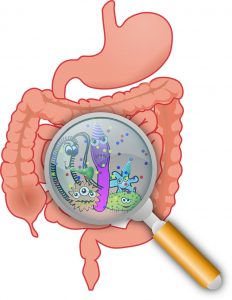Medicines are well known life savers; they save millions of lives every year from hundreds of dreadful diseases.
No matter how prepared we are, we can still be susceptible to infectious diseases and they can come back to haunt us.
The human microbiome is an ecosystem that is a collection of trillions of microbes; human and microbial cells, each have a specific genetic expression and collectively make us a ‘super organism’. Newborns start to pick up microbes at birth. This is a selective process and gradually introduces complementary and useful microbes that help the body to undertake essential body functions. It adds around 8 million genes to the estimated 20,000-25,000 human genome. Within a period of three years a mature microbiome is developed.
The human microbiome resides in the mouth, gut, vagina and on the skin, but varies greatly between the different body sites. As an example the microbiome difference between the mouth and the gut is comparable to the difference in microbes in the ocean and soil. Skin microbes prevent pathogens from colonising the skin and stimulate the immune system. Similarly gut bacteria functions include; synthesis of vitamins and neurochemicals, assist digestion and strengthen the immune system. For this reason science has firmly established the relationship between a healthy gut microbiome to overall wellness and good health.
Although comparable, the mibrobiome also varies from one person to the other. Likely influencing factors include, host genetics, diet, environment and exposure to specific microbes in early life.
Medicines: A Miracle or a Martyr?
Over decades we have been witnessing a serious rise in antibiotic prescriptions. Historically, antibiotics have a proven role in warring against harmful bacteria/viruses saving us from countless infections. Unfortunately they are not discriminatory and like many battles the price we pay is in the collateral damage to our microbiome.
According to the research data published by the European Molecular Biology Laboratory (EMBL), one out of four antibiotics negatively affects the growth of gut bacteria. The carefully nurtured gut microbiome falls out of balance, thus upsetting our delicate intestinal ecosystem consequently increasing our risk for disease and chronic conditions e.g. IBS, diabetes, leaky gut, food intolerances.
These findings raise another serious question; could these changes also contribute to antibiotic resistance?, and in the same way can other non-antibiotic drugs similarly damage the microbiome ? Commonly prescribed medicines (NSAIDs, antipsychotics, anti-diabetics, proton pump inhibitors, and so on) have been known to create changes in microbiome composition.
To further answer this the EMBL study screened more than 1,000 marketed drugs to try and understand their effects on 40 strains of gut bacteria. The study’s conclusive statement was that more than 24% of the marketed drugs affected the growth of at least one bacterial species.
In 2019, Belenky and his colleagues published a study in Cell Metabolism. The study was conducted in mice. It was found that antibiotics changed the metabolism and composition of the mice gut microbiome.
Although still not the full picture, these studies offer a snap shot of the potential damage common drugs can do to healthy gut microbial function.
Therapy, Diet & Microbiome
Medical studies suggest that a healthy diet; low in simple sugars and high in fiber increases the susceptibility of gut microbiome to certain antibiotics. Researchers found that adding glucose to a mouse’s diet (normally low sugar, high fiber) increased the susceptibility of certain bacteroides to amoxicillin. This validates the importance of how our diet can protect gut microbiome from the disturbing effects of antibiotics.
Most importantly, any excessive or unnecessary medication can seriously damage your gut function. Changes to your diet, and seeking alternative therapies can help to reduce the need for medicines, whilst the introduction of prebiotic foods (e.g. garlic, onions, yogurt, kefir, fermented food, bone broth) and probiotic supplements will enhance microbiome function.
A new study has shown improvements in mice gut microbiome with electro acupuncture and moxibustion treatments. Similar microfloral changes were reported by another study using electro acupuncture on obese rats.
To further reduce the need for prescription medicines, therapies like acupuncture, massage and hypnotherapy can be effectively used in place of or as an adjunct for many conditions e.g. pain, anxiety, depression and other conditions.
